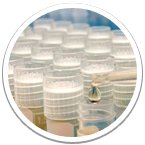The National FINRISK Study 1992-2012
The FINRISK cohorts comprise the respondents of representative, cross-sectional population surveys that are carried out every 5 years since 1972, to assess the risk factors of chronic diseases (e.g. CVD, diabetes, obesity, cancer) and health behavior in the working age population, in 3-5 large study areas of Finland. THL Biobank hosts samples collected in the following survey years: 1992, 1997, 2002, 2007, and 2012. In addition, the biobank hosts the Kuusamo Health Examination 2011 study, a pilot study of FR2012 as well as DILGOM 2007 Survey and its follow-up DILGOM 2014.
The MONICA and EHES (EU) procedures were applied in phenotype collection (cf. MORGAM) and a wide spectrum of laboratory tests was carried out from serum and plasma samples. Background information on socioeconomic status, medical history, diet, exercise, measured anthropometric measures, etc. was collected by questionnaires and during a clinical visit. In addition the cohorts have been followed up by linking them to the national hospital discharge register, causes-of-death register and cancer register.
MONICA website
EHES website (in Finnish)
MORGAM website
Samples and data available in THL Biobank
A brief introduction to the FINRISK Study and description of the material available in THL Biobank can be found in the 'Read me first' file.
DNA samples are available for the FINRISK 1992-2012 cohorts (over 35 000 participants) and plasma/serum samples are still available for the FINRISK 2002-2012 cohorts (over 21 000 participants). The FINRISK 1992-2012 cohort sizes are 6000-8800 per survey. For more detailed information, please see the 'THL Biobank Sample availability table'.
Detailed list of attributes available in the biobank can be found in the variable descriptions files, separately for each study year. Summarized information on nutrition data in different biobank cohorts is provided in the document 'Nutrition data available in THL Biobank'.
Genome-wide SNP data and NMR metabolomics data are available for majority of the FINRISK participants. Genome- or exome-wide sequence data is also available for selection of sample donors. For more detailed information of the omics data, please see the 'THL Biobank Omics availability table'. Detailed descriptions of NMR data produced from FINRISK samples are in the 'Description of the NMR data' file.
The register based end-point data produced in THL by FINRISK research group is described in 'Description of register-based end-point data' file, please note that using this data requires project specific permission from Findata.
FINRISK 2002 Microbiome Study
Microbiota analysis of stool samples collected from approximately 7200 FINRISK 2002 participants was performed at the University of California, San Diego, using whole genome untargeted shallow shotgun metagenomic sequencing against mapped reference databases. More details about the metagenomic sequencing are available in the recent publication by Palmu et. al.
Association Between the Gut Microbiota and Blood Pressure in a Population Cohort of 6953 Individuals
The metagenomic data is available via EGA and can be used as anonymous dataset.
DILGOM 2007 Survey and DILGOM follow-up 2014 survey
DILGOM 2007 Survey was conducted as a sub-study of The National FINRISK 2007. The follow-up of DILGOM 2007 was done seven years later, resulting DILGOM 2014 follow-up survey.
The abbreviation DILGOM comes from the name DIetary, Lifestyle, and Genetic determinants of Obesity and Metabolic syndrome. The Surveys are population studies on how nutrition, diet, lifestyle, psychosocial factors, environment and genetics are linked to obesity and the metabolic syndrome. The donor samples were collected to the THL Biobank at the research sites of Helsinki, Vantaa, Turku and Loimaa area.
DILGOM 2007 has data available for nearly 5000 participants. Sample collection was done within the framework of FINRISK 2007 and no additional sampling was done.
DILGOM 2014 is a follow-up survey of DILGOM 2007 and has samples and data available from nearly 1300 participants.
Kuusamo Health Examination 2011 Study
Kuusamo Health Examination Study is a pilot study for The National FINRISK 2012 conducted in Kuusamo area, which is a known genetic isolate in Finland. The Kuusamo Study was conducted with the focus on testing EHES procedures for phenotype data collection, methods to increase study participation rate and to pilot collection and use of cell samples in epidemiological population studies.
250 Kuusamo area residents participated in the study.
Additional information
Read more on The National FINRISK Study website
DILGOM 2014 follow up survey (in Finnish)
Access to samples and data
Availability queries and application process to access THL Biobank resources
Contact
admin.biobank (at) thl.fi
The National FINRISK Study, cohorts 1992-2012
More than 35 000 sample donors (DNA, serum, plasma), aged 25-74 y
Population-based study, standardized health examinations.
Genome-wide SNP data, sequencing data and NMR metabolomics data available
DILGOM 2007
Nearly 5000 sample donors (DNA, RNA, serum, plasma), aged 25-74 y
A sub-study of the National FINRISK 2007
Focus on studying risk factors of metabolic syndrome
DILGOM 2014
Nearly 1300 sample donors (DNA, RNA, serum, plasma, frozen cells), aged 32-81 y
A follow-up study of the DILGOM 2007
Kuusamo Health Examination Study 2011
250 sample donors (DNA, RNA, serum, plasma, frozen cells), aged 25-74 y
A pilot study of the National FINRISK 2012 Study
Description of the NMR data (xlsx 33 kb)
The NMR data is produced by Nightingale Health in 2018-2019
Description of register-based end-point data (xlsx 84 kb)
This data is produced in THL using data from national health registers
Using this data requires project-specific register permission from Findata, and cannot be authorized by THL Biobank




